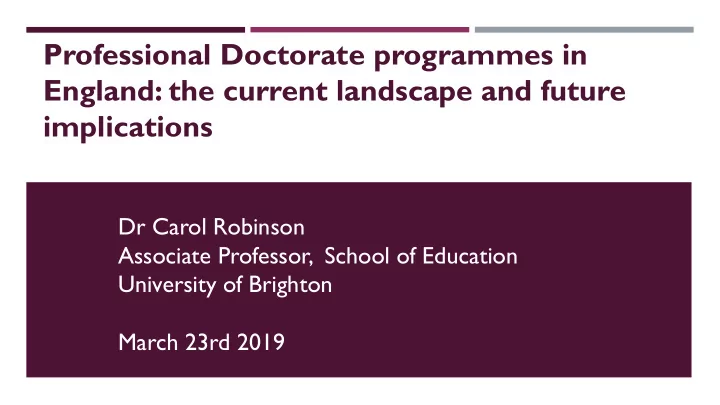

Professional Doctorate programmes in England: the current landscape and future implications Dr Carol Robinson Associate Professor, School of Education University of Brighton March 23rd 2019
Aims of study Examine existing PD provision and understand models used in PD programme delivery Consider HEI’s strategies for PD provision and how this might change in the future within an evolving postgraduate research context Explore the skills and attributes that PD programmes seek to develop Explore impact of PD programmes on graduates, their employers and professions, and provider institutions
Data collection Survey of HEIs (63 responses) Desk research of HEI websites Interviews/focus groups with over 30 academic staff, and a similar number of PD candidates and alumni; and 7 senior institutional staff Review of literature relating to PDs in UK HEIs
Definition of PDs A programme of advanced study and research which, whilst satisfying university criteria for the award of doctorate, is designed to meet the specific needs of a professional group external to the university, and which develops the capability of individuals to work within a professional context (UKCGE, 2002, 62)
Characteristics of PDs Purpose – PDs aim to develop capacity to make significant original contribution to professional practice through research Research focus – research within a PD directly relates to, and is rooted in, professional practice of the candidate Structure – PD programmes are more structured than many PhD programmes
Range and extent of PD provision Provision predominantly in four ‘main’ subject areas – Education; Business; Psychology; Health and social care PD model can be seen across a wide range of new subject areas, e.g. forensic science, public administration Small cohorts
JACS Subject Group No. of No. of Key PD themes / institutions programmes programmes Education 54 72 EdD Business & Administrative Studies 38 48 DBA Biological Sciences 37 65 Psychology, DclinPsy Subjects Allied to Medicine 37 81 Health & social care Medicine & Dentistry 10 13 MD, Ddent History & Philosophical Studies 9 11 Theology Creative Arts and Design 6 7 Social & Political Sciences 6 7 Law 5 5 Criminology Agriculture and Related Sciences 2 2 Architecture, Planning etc. 2 2 Computing Science 2 2 Generic/transdisciplinary 2 2 Languages 1 1 Physical Sciences 1 1 Veterinary Medicine 1 1
PD programme title Award abbreviation Science-related: Professional Doctorate in Architecture, Design and Built DArch Environment Professional Doctorate in Agriculture and Food DAgriFood Professional Doctorate Biomedical Science DProf Professional Doctorate in Science & Technology DProf Professional Doctorate in Veterinary Science DVet Computing and information science: Professional Doctorate in Data Science DDataSci Professional Doctorate in Digital Media DProf Social sciences and criminology: Professional Doctorate in Criminal Justice DCrimJ Doctorate in Criminology and Criminal Justice DCCJ Professional Doctorate in Applied Criminology DAppCrim Professional Doctorate in Security Risk Management Professional DSyRM Doctorate - Policing, Security and Community Safety Doctorate in Social Science Doctor of Public Policy DSocSci Professional Doctorate in Policy Research and Practice DPP DPRP Arts and humanities: Doctorate in Design DDes Doctor of Creative Arts DCreative Doctorate in Fine Art DFA Professional Doctorate in Applied linguistics DAppLing Doctorate in Heritage DHeritage Other professional fields: Professional Doctorate in Elite Performance [sport] DProf Professional Doctorate in Sport and Exercise DSE Theology: Professional Doctorate in Pastoral Theology DPT Doctor of Ministry DMin Professional Doctorate in Practical Theology DPracTheol, DThM
Enrollments and completions in one academic year 899 students enrolled on 25 Education programmes, averaging 36 students per programme (103 completions) 592 students enrolled on 16 Business and Management programmes, averaging 37 students per programme (26 completions) 485 students enrolled on 16 Psychology and Psychotherapy programmes, averaging 30 students per programme (108 completions) 337 students enrolled on 22 Health and Social Care programmes, averaging 15 students per programme (31 completions) 287 students enrolled on 21 ‘other’ programmes, averaging 14 students per programme (22 completions)
Study experiences, impact and challenges 2-stage approach, with taught first stage and formal transition to research/thesis stage is common Taught element contains doctoral and research focused content Where cohorts are small, teaching of taught modules is not cost effective Candidates report cohort-based nature of PD is a highlight of their experience Challenges for institutions is providing sufficient supervision of specialist research projects undertaken by PD candidates
Institutional supply and employer demand Demand for PD-qualified staff from employers is relatively weak Candidates motivated by prospect of career change rather than progression with current employer Overt employer support for candidate’s participation in PD programmes is increasingly rare and entitlement to study leave is decreasing
The future sustainability of PD programmes Tensions: 1. Lack of common understanding of purpose and value of PDs 2. Difficulties in recruiting sufficient numbers of supervisors and examiners within niche areas of professional practice 3. PD programmes that enroll small numbers of candidates are not financially viable. 4. Attempts to counteract negative financial implications of low enrollments often reduce positive aspects of the cohort experience favoured by students
Looking to the future: food for thought How can institutions/schools within institutions collaborate in delivery of common aspects of PD programmes? Should the taught elements of PDs have consistent credit allocation? What measures need to be taken to ensure the future sustainability of PDs in your field/HEI? Would ‘new’ PD progs benefit your specialist area/location?
Recommend
More recommend